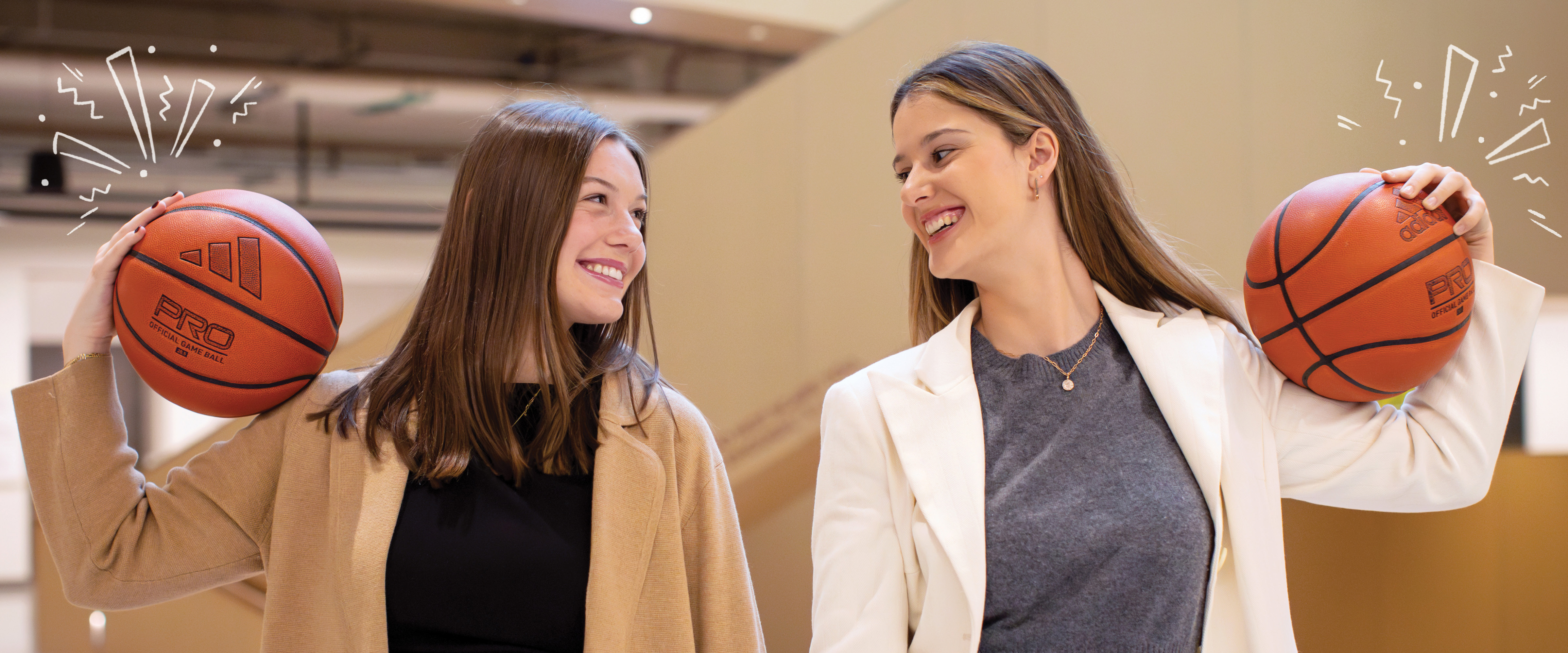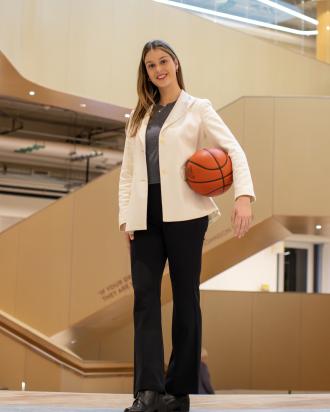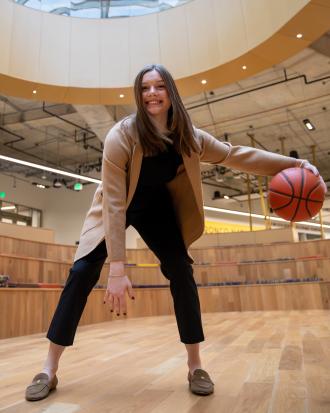
Being the best version of yourself. It’s challenging and exciting. It offers the opportunity for you to grow, finding an equilibrium between pushing yourself past obstacles and staying true to your core values. Artemis Kouki and Maggie Stutelberg, WMU women’s basketball co-captains, are consistently evolving into better versions of themselves as players and students. The human resource management majors lead the team, not only striving to reach their personal bests, but assisting 15 team members in doing the same.
Voted co-captains by their fellow players, Kouki and Stutelberg take the honor of being team captains extremely seriously. “Our teammates select who they want to lead them,” says Kouki, who hails from Greece. “It was a great feeling to know that the team believed in me. Reflecting on my journey as a 17-year-old girl arriving in the States and struggling to speak fluent English, it makes me emotional to see how far I’ve come. Knowing my peers trust me as a team leader is truly rewarding. It’s a reminder of how much I’ve grown both as a player and as a student. I feel that I am able to relate to a lot of my teammates and what they are going through and help them. Listening and encouragement is key.”
As with any team sport, adaptability has been central for these Business Broncos as they work to motivate team members. “We have experienced many significant events as a team such as numerous season-ending injuries,” says Stutelberg. “The dynamics on a Division I team involve a lot of role change for all players and for us as captains. My goal is to assist teammates in having the best experiences that they can both on and off the court. In the end, being a good team captain comes down to great communication and what that looks like with one player can differ a lot from what it looks like with another. Being able to provide support while also giving a teammate a healthy and positive push when needed is a skill I am improving at daily.”
An intangible balance of community and rigor is what drew Kouki and Stutelberg to WMU four years ago. “I wanted to play college basketball, and I found the best combination of academics and athletics at WMU,” says Kouki. “I also had a true sense of belonging right from the very beginning, which is particularly important as an international student.” Stutelberg shares a similar sentiment. “The coaches were all genuine, and that came through immediately, which is something that you don’t always find as you are considering your options at different schools. The academic reputation of the Haworth College of Business was appealing to both of us.”
In addition to sharing a love of basketball and the team captaincy, Kouki and Stutelberg share a major—human resource management.
For Kouki, many of the reasons she wanted to come to the United States such as gaining new perspectives, learning from people of different cultural backgrounds, and developing her skills were some of the same things that attracted her to the human resource management program. “I have found our courses on diversity, equity and inclusion extremely interesting. As globalization continues to increase, our ability to learn from others and to work cross-culturally will be increasingly important. After studying diversity, equity and inclusion in several courses, I could see myself pursuing a career in this area of HR.”
For Stutelberg, HR’s function in helping organizations continuously improve and people personally develop resonated deeply with her innate talents. “I think that helping advance employees’ knowledge while helping companies serve their ultimate business purpose aligns with my skills in connecting with people as well as my competitive streak where I seek opportunities to strive for team excellence.” Stutelberg had to learn to pivot and redefine what being exceptional means in the last several months as she rehabbed an injury to her ACL, which took her off the court for about nine months. “Through my recovery, I have learned to give myself grace and to accept what I can’t change. It was reassuring to know my teammates still wanted me to serve as captain despite the physical limitations I was facing.”
Support from team members, coaching staff and HR faculty has been crucial for these student-athletes, who are considered among the best students in their academic program. Kouki notes, “Our human resource management faculty get to know their students, so they are aware of our workload, travel and the importance of rehab for student-athletes who have minor or major injuries to address. They are always so understanding and supportive, and we truly appreciate that. They are proud of the commitment we have made as student-athletes.”
What stood out to Stutelberg from day one with the basketball coaching staff—sincerity and true care about student-athletes as individuals—holds true for human resource management faculty as well. “Our faculty members hold us to the same high standards while also asking us, ‘What can I do to help you be successful and reach all your aspirations as both a student and an athlete?’ It means a lot to have your mentors rooting for you to do well in all your passions.”
Both students note that HR faculty members have done a superior job with individual student support and have provided relevant instruction with experience-driven projects. Above all, both women note human resource management faculty create a safe space in the classroom to have dialogue where all viewpoints are respected, creating a wonderful environment to explore any topic.
“Artemis and Maggie stand out as exceptionally hardworking and dedicated students,” says Dr. Chen Wang, assistant professor of management. “Balancing the demands of being student-athletes, they consistently put in the effort to excel academically, never letting their busy schedules slow them down. If anything, their discipline only enhances their performance. It’s no surprise to see them now leading as co-captains of the basketball team. They embody the spirit of HR Broncos!”
Kouki and Stutelberg were two young girls who dreamed of playing basketball at an elite level, who achieved that. They are now two young women charging toward success as business leaders—where there are no points but plenty of goals. Both have learned what it means to collaborate and truly lead a team by seeing their fellow students, accepting them for who they are, and asking their teammates and themselves what it takes to be the best version of yourself.




